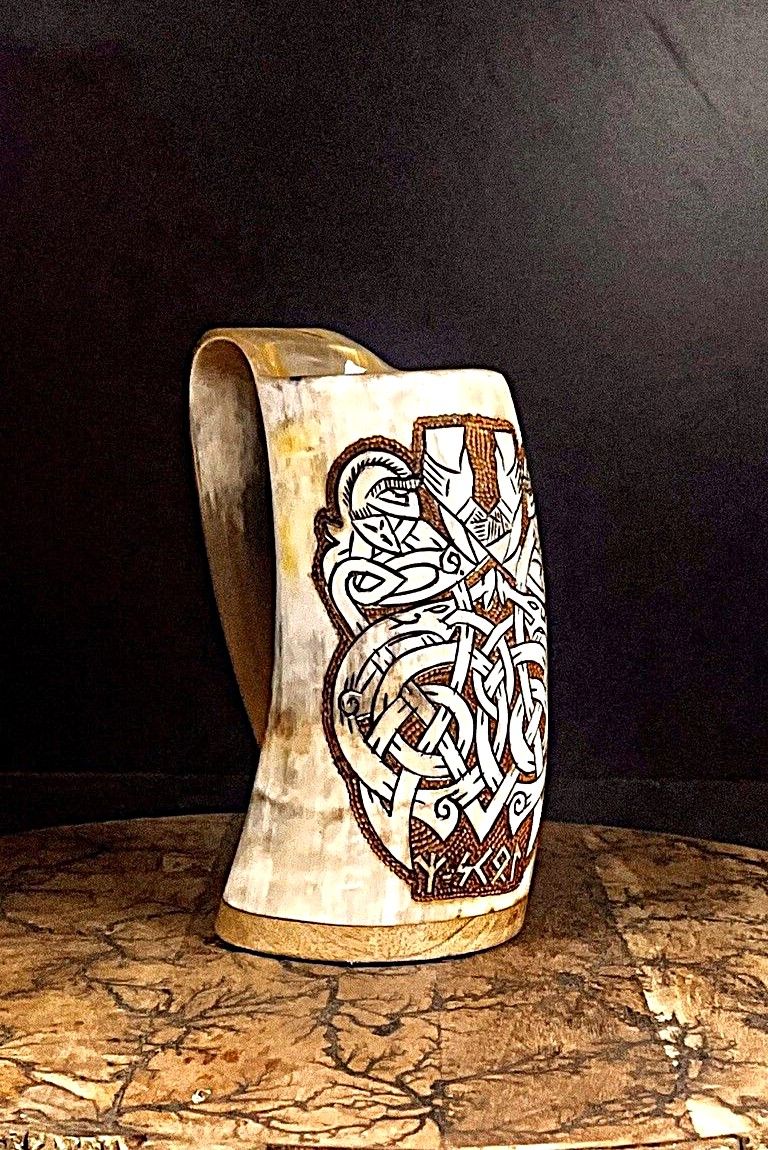Crafting Norse Art Excellence: Premium Viking Drinking Horn Cups Collection - "Mead Hall"
Viking Drinking Horn Cup "Mead Hall" (Complete Set with Gift Bag). SKAL Collection from AlgizRune Workshop (Canada)
Embrace the Viking spirit with our Premium Quality Viking Drinking Horns and Mugs, thoughtfully designed as a gift set. Each set includes a beautifully crafted stylish gift bag for convenient storage or gifting, perfect for LARPing (Live-Action Role-Playing) adventures, as Viking movie props, Viking home or restaurant décor.
This mug available in two sizes, 400-500 ml and 700 ml - 1 Litre, these drinking horn cups are not just vessels; they're a piece of Viking heritage ready to elevate your drinking experience.
Carefully polished and cleaned top quality drinking horn that is safe to drink from. The shape and colour of the horn may differ from that in the picture. It suites cold drinks like Beer, Mead, Wine. Horn cups not suitable for strong alcohol drinks, dishwashing machines, microwaves, etc.
Wash it with warm water after using and it will work for you for 1000 years:)
Norse Horn cup masterpiece came from Algizrune Norse Pagan Arts Workshop Canada. Design protected by UK and Canadian Law.
Important: Free shipping for our SKAL horns cups made from Canada so import taxes may apply on importation and its buyer responsibility.
Mead Halls and their importance in Viking society:
Mead halls, also known as "feasting halls" or simply "halls," are prominent elements in Old English and Norse myths, legends, and literature. These large, communal structures played a central role in the social and cultural life of early Germanic and Scandinavian peoples. Here are a few notable myths, legends, and literary works in which mead halls are described:
- Beowulf: "Beowulf" is one of the most famous Old English epic poems, and it prominently features the mead hall known as Heorot, the grand hall of the Danish King Hrothgar. The construction and subsequent attacks on Heorot by the monster Grendel and his mother are central to the story.
- Nibelungenlied: The German epic poem "Nibelungenlied" features King Gunther's mead hall in Worms, where much of the epic's action takes place. This hall is the setting for many important scenes, including the arrival of the hero Siegfried.
- Norse Mythology: Mead halls are frequently mentioned in Norse myths. Valhalla, the hall of the slain, is a mead hall in Asgard where brave warriors who die in battle are taken by the valkyries to feast and prepare for Ragnarok. Additionally, the mead of poetry, which bestows poetic inspiration, is a central element in the story of how Odin obtained the mead from the giantess Gunnlod.
- Hávamál: This is one of the poems in the Poetic Edda, a collection of Old Norse poetry. In Hávamál, Odin imparts wisdom to humanity, and he describes the ideal behavior and conduct in a mead hall, emphasizing the importance of hospitality and the proper use of mead.
- The Saga of the Volsungs: In this Norse saga, the mead hall of King Volsung is a central location for feasting, storytelling, and drama. It is also the setting for important events in the saga's narrative.
- The Saga of the Ynglings: This saga includes references to the mead hall of Swedish King Aun, where a magic drink called "Suttungr's mead" plays a significant role in the story.
- "The Wanderer" (Anglo-Saxon poem): In this Old English poem, a lonely wanderer laments the loss of his lord and the destruction of his lord's mead hall, reflecting on the impermanence of human existence.
Mead halls were not only physical structures but also important symbols of community, hospitality, and the warrior ethos in the cultures of early Germanic and Scandinavian peoples. They are featured in a wide range of myths, legends, and literary works that provide insights into the social and cultural values of these societies.

